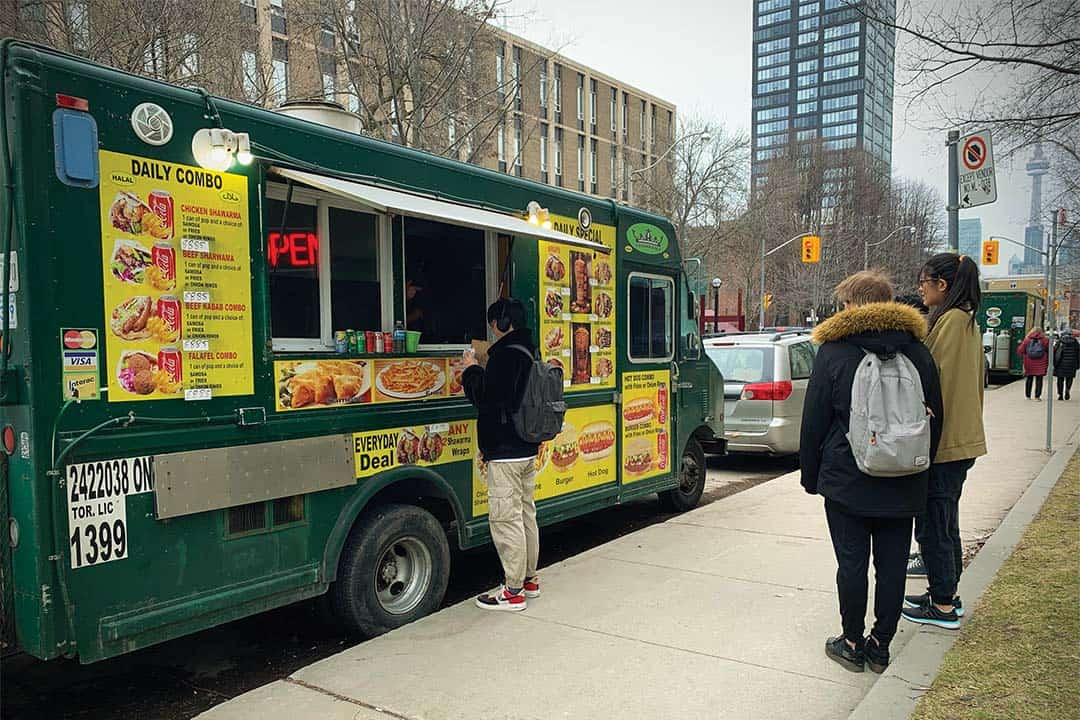Wherever U of T students step at UTSG, they are greeted with several colourful food trucks lining up on St. George Street. Grabbing lunch from one of these trucks in between classes is a U of T staple.
While enjoying the convenience and affordability of food trucks, what students don’t see is the effort that goes on behind the scenes, as food truck owners struggle to keep their businesses afloat. Their financial troubles have been exacerbated by increased competition from other trucks.
Brutal bylaws
Every five hours, food trucks including Pita Express, Food From East, and others along St. George Street must shut down and pack everything up in order to switch parking spots with another food truck and unpack everything again.
This seemingly pointless move is necessary for food trucks with temporary licenses to comply with city bylaws. Toronto allows most food trucks to operate in any location for a maximum of five hours.
The City increased the time limit for food trucks from three hours in 2015. In 2017, CBC News reported that the number of food trucks operating in Toronto increased from 14 to 56 as a result of operating food trucks becoming more convenient.
“The staff [gets] so tired… [because] we have to organize everything… it’s too much work,” described Muhammad Saqib, manager of Food From East truck in an interview with The Varsity.
Increased competition
“[Business is] getting worse everyday,” says Dimitar Georgiev, who owns Blue Chip Truck. As more food trucks showed up on campus, the competition diminished their customer base, he described in an interview with The Varsity. He has been running the truck since 2006 and expects that he will close the truck next year.
Ramo Shoka pulls into St. George Street every morning at 5:00 am. He has been selling shawarmas, falafels, and other portable meals to UTSG students out of his food truck, Pita Express, since 2015. “You have to come early, early, to park. If you don’t have the spot, you lose your day,” he told The Varsity in an interview.
“We are the city’s busiest truck, I can tell you, but it’s not like before,” says Hatice Onurman, who has been serving customers at UTSG out of the Brown Food Truck for almost 18 years.
To increase prices or not to increase amidst inflation
According to Statistics Canada, food prices in Canada have been rising dramatically for two years in a row.
Saqib noted that the cost of food among Food From East’s operating costs went from 25 percent before the pandemic to 45 percent after lockdowns. Onurman described that prices get higher “for ketchup, for potatoes, each [item],” every time the Brown Food Truck restocks.
Still, the St. George food trucks are reluctant, on the whole, to increase their menu prices. “Since 2006 till now, I have increased my prices [by] one dollar,” said Georgiev. Mohammed Sayeed, who manages The Shawarma Truck, told The Varsity in an interview that their menu prices also haven’t budged: “We are trying to give [students] good quality plus [good] price.” The truck has been operating on St. George street since 2015.
Saqib noted that Food From East is aware of customers’ “student budget,” and that low prices help the business compete with indoor food options.
Surviving the lockdown
U of T campuses shut down in March 2020 and did not open until September 2021,, leaving St. George Street devoid of students and thus customers for the food trucks. During this time, food trucks stopped their operations. Food from East tried opening on campus for a couple days during the pandemic, Saqib recalled, but did not make any sales whatsoever.
“Like six, seven months, we survived without a single penny,” described Sayeed.
“I am in debt — 80,000 dollars,” said Georgiev. He described that he had to continue making insurance payments on the Blue Chip Truck while the business was shut down, and that the only help he could get from the city was a loan.
Onurman recalled that business was initially very slow as the Brown Food Truck returned to campus, because students were wary of buying food in the wake of lockdown restrictions despite the truck following sanitizing and cleaning protocols.
A connection to the community
“I like the people here. I enjoy it,” said Onurman, no matter if business is good or bad. Even when her customers pass by without getting anything, she described, she will still call out to them to say hi.
“We feel like we are families… it’s not just business between us and the students,” said Shoka.
For St. George food trucks, business is precarious. But they are also a valuable and inseparable part of campus life for those in the U of T community.


